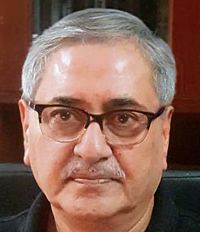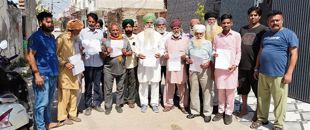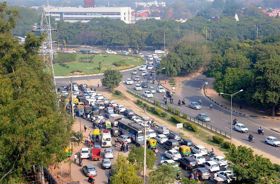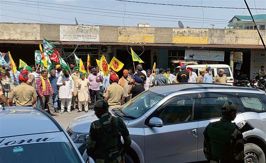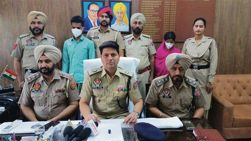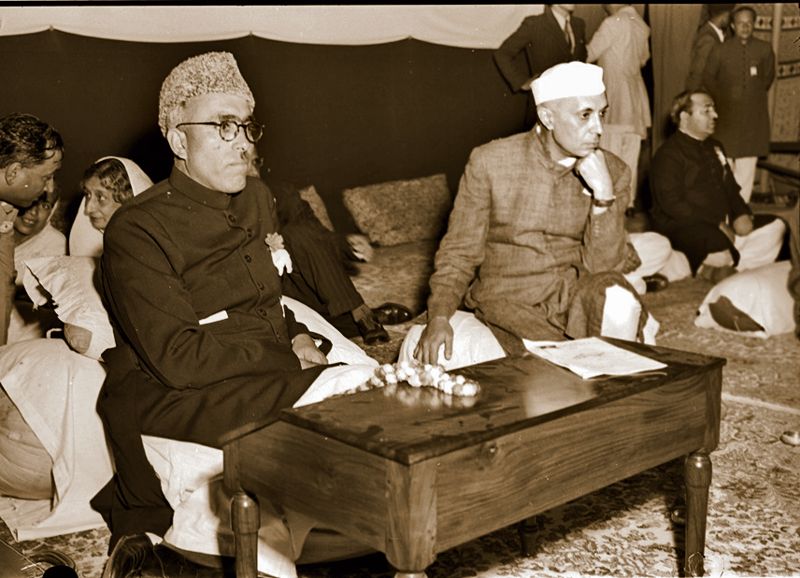
Strategy: Sheikh Abdullah played on Nehru’s sentimental connect to Kashmir. twitter
Raghuvendra Tanwar
Chairman, Indian Council of Historical Research
THE idea of the special provision of Article 370 was conceived as an understanding between two close friends — Jawaharlal Nehru and Sheikh Abdullah. It was never on the mainstream agenda or an issue of common discourse. On the contrary, as Khwaja Ahmad Abbas had put it, the mass of public opinion was unconditionally with India: “Let us be clear, Kashmir will vote for India... the whole weight of Kashmir is on the side of India against the ideology of Pakistan” (The Current, October 26, 1947).
Patel disapproved of Abdullah’s role in the drafting of the Constitution’s provisions relating to J&K.
Nehru had a mini-Cabinet of ministers for Kashmir, including Maulana Abul Kalam Azad, Gopalaswami Ayyangar and Kailas Nath Katju. The Congress Working Committee had wanted Sardar Patel to look after Kashmir. However, Patel was sidelined. For instance, Ayyangar bypassed the Home Department and requisitioned 150 vehicles from Punjab for work in Jammu and Kashmir in November 1947. Patel conveyed his displeasure to Ayyangar, who, in turn, had forwarded the exchange of notes to Nehru. Nehru’s angry letter to Patel leaves little doubt as to who was the boss when it came to Jammu & Kashmir: “I really do not understand where the States Ministry comes into the picture.... All this was done at my instance and I do not propose to abdicate my functions in regard to matters for which I consider myself responsible.”
Patel’s reply to Nehru’s note appears in Volume I of Sardar Patel’s Correspondence as a draft copy (December 23, 1947). The letter was not sent because Patel had by then been persuaded to drop the matter: “Your letter has... caused me considerable pain... your letter makes it clear to me that I must not or at least cannot continue as a member of government and hence I am hereby tendering my resignation.”
Patel disapproved of Abdullah’s role in the drafting of provisions of the Constitution relating to Jammu & Kashmir and noted: “You can yourself realise the anomaly of the state becoming part of India and at the same time not recognising (key) provisions... whenever Sheikh Sahib wishes to back out, he always confronts us with his duty to the people. Of course, he owes no duty to India or to the Indian Government or even on a personal basis to you and the Prime Minister who have gone all out to accommodate him. In these circumstances, any question of my approval does not arise. If you feel it is the right thing to do, you can go ahead with it.”
Nehru was in the US when the proposal was debated in the Constituent Assembly. It was Nehru’s draft that was first put up before the Congress members of the Assembly. Indian Civil Service officer V Shankar (Patel’s private secretary) noted: “... in the party there was a strong body of opinion which looked askance at any suggestion of discrimination between the Jammu and Kashmir state and other states... Sardar was himself fully in accord with this opinion, but due to his usual policy of not standing in the way of Pandit Nehru... he had kept his own views in the background. In fact, he had not taken any part in framing the draft proposals with the result that he heard the proposals only when Ayyangar announced them to the Congress party. The announcement was followed by a storm of angry protests from all sides. Metaphorically, the situation may be succinctly described by saying that both Ayyangar and his proposal were torn to pieces by the party... Sardar received a telephone call from Ayyangar explaining... that only Sardar could intervene to save the situation and appealed to him to come to his rescue. Sardar heard him and lapsed into silence.”
Patel wrote: “If Jawaharlal were here, I could have had it out with him. But how could I do so with Ayyangar, who was only acting under orders? If I did, people would have said that I was taking revenge on his confidant when he was away. Ayyangar had appealed to me for help. How could I have let him down in the absence of the Chief?”
Nehru has left several notes on the issue, but it is a fascinating note of July 3, 1952, that explains why he believed that Jammu & Kashmir required a special constitutional provision (which eventually became Article 370): “The first question that arises is this: all constituent units of the Republic of India have exactly the same relation to the Union as embodied in our Constitution... or can there be a variation?... It must stand on exactly the same footing, then there is not much room for argument and Kashmir must line up with others... This is not a practical proposition and even from a larger point of view it is desirable to have certain flexibility in our Constitution. Therefore, we proceed on the basis of some special treatment of Jammu & Kashmir state in this connection…”
Nehru was among the handful of people who thought on these lines at the time. This defied popular sentiment not only among the public and the party but, most importantly, in the Constituent Assembly and later in Parliament. This happened because Abdullah had carefully played upon Nehru’s emotional and sentimental connect to Kashmir and while doing so ingrained in Nehru’s mind the false narrative that, because of its Muslim majority, Kashmir would be lost to India until some special provisions were provided. A trusting, well-meaning Nehru was outwitted by a man who benefitted immensely from Nehru’s generosity. Nehru carried the burden of this misreading and misjudgement till his last days.
Join Whatsapp Channel of The Tribune for latest updates.






